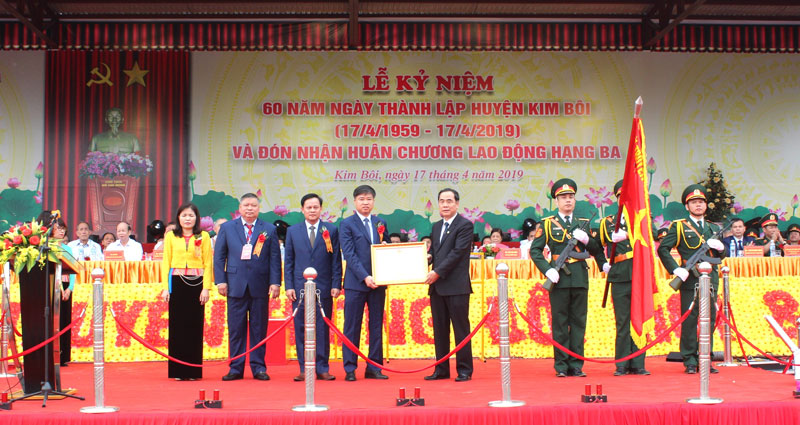
(HBO) – Kim Boi district held a ceremony to mark its 60th founding anniversary (April 17, 1959-2019) and receive third-class Labour Order.
In the past 60 years, from a poor district,
Kim Boi has followed the path to renewal, thus gaining a lot of achievements to
contribute to the province’s development. By the end of 2018, economic growth
reached 15.4 percent, per capita income surpassed 21 million VND a year, the
poverty rate was reduced by 4-5 percent a year to 20.14 percent, the economic
structure was shifted in a positive direction, infrastructure invested
synchronously, the face of new-style rural areas lifted, defence security and
social order and safety was ensured, the political system maintained, the
national great unity consolidated, and locals’ material and spiritual lives
bettered.
 Under the authorization of the State President, Vice
Secretary of the provincial Party Committee and Chairman of the People’s
Committee Nguyen Van Quang presents third-class Labour Order to the district’s
Party Committee, authorities and people.
Under the authorization of the State President, Vice
Secretary of the provincial Party Committee and Chairman of the People’s
Committee Nguyen Van Quang presents third-class Labour Order to the district’s
Party Committee, authorities and people.
In recognition of the achievements gained
by the district, the Party and State awarded Kim Boi district with noble awards
such as second-class Labour Order (1999), Hero of People's Armed Forces (2002),
third-class Independence Order (2004), and second-class Independence Order
(2009). On the occasion of the 60th founding anniversary of the district, it
was honored with the third-class Labour Order for its outstanding achievements
and contributions to the construction of socialism and national protection in
recent years.
Quang asked Kim Boi Party Committee, administration
and people to continue stepping up patriotic emulation movements, paying more
attention to improving the quality of administrative reform, implementing
defence and security work, speeding up the "all people join hands to protect
the nation” movement, and developing cultural, physical training and sports
activities.
Within the framework of the celebration,
Kim Boi district organised many activities, attracting the participation of a
great number of people such as a parade, cultural performances, an exhibition highlighting
the district’s achievements and development and art performances./.
The Standing Board of the Hoa Binh provincial Party Committee has agreed in principle on a proposal by the Standing Board of the Party Committee of Hoa Binh city to gather feedback on the city’s 1:2000 zoning plan, which forms part of its broader urban development strategy.
Hoa Binh province has made notable progress in public administration reform and digital government development, with the satisfaction index among citizens and businesses reaching over 84%, according to recent government evaluations.
Thanks to great efforts by local authorities in recent times, the governance and public administration performance of Mai Chau district has been significantly improved.
In the afternoon of June 6, the Party Committee, the People's Council, the People's Committee and the Fatherland Front of Lac Son district solemnly held a meeting to celebrate the 139th anniversary of the district's founding (1886–2025) and the 79th anniversary of the establishment of the district's Party Committee (1946–2025). There was the attendance of Mr. Bui Van Thang, the Vice Chairman of the Provincial People's Council; Mr. Quach Tat Liem, the Vice Chairman of the Provincial People's Committee; Ms. Dang Bich Ngoc, the Deputy Head of the National Assembly Delegation of the province; as well as the former leaders of the province and district through various periods, who are the natives of the district.
Implementing the Politburo’s Resolution No. 57-NQ/TW on breakthroughs in science – technology, innovation, and digital transformation is a golden opportunity for the northern mountainous province of Hoa Binh to renew growth model, improve competitive edge and shorten digital gap.
Resolution 57-NQ/TW, issued by the Politburo on December 22, 2024, identifies sci-tech, innovation, and digital transformation as strategic breakthroughs to build a developed and prosperous nation. In Hoa Binh province, this spirit is not just a slogan, it’s being put into action through concrete initiatives that form a "new development triangle”: digital citizenship, digital economy, and digital administration.



 Under the authorization of the State President, Vice
Secretary of the provincial Party Committee and Chairman of the People’s
Committee Nguyen Van Quang presents third-class Labour Order to the district’s
Party Committee, authorities and people.
Under the authorization of the State President, Vice
Secretary of the provincial Party Committee and Chairman of the People’s
Committee Nguyen Van Quang presents third-class Labour Order to the district’s
Party Committee, authorities and people.